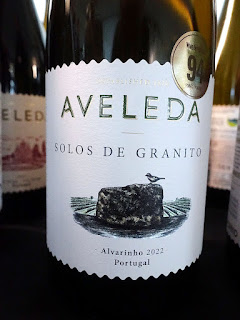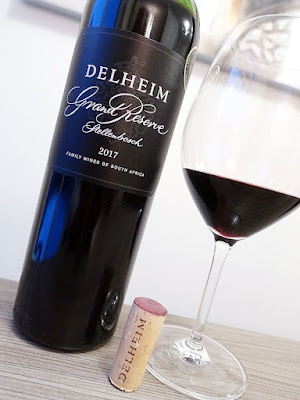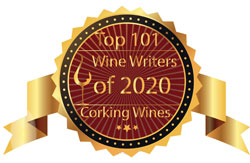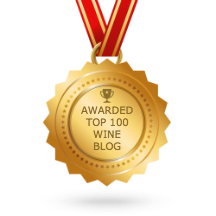red wine review is a lovely Pinotage from South Africa that arrived at the LCBO in last month's LCBO VINTAGES New Release Collection.
It is produced by Kanonkop Wine Estate, a 4th generation family-owned estate situated in the Stellenbosch wine region of the Western Cape, South Africa. While the farm has existed since the early part of the 20th century, the first wines bearing the Kanonkop label were produced only in 1973.
The name Kanonkop is derived from a cannon (kanon) that was located on a hillock (kop) on the Simonsberg mountain above the wine estate that was fired to announce the arrival of sailing ships entering Table Bay during the 17th and 18th centuries. The loud roar of the cannon signalled to local farmers that they needed to load up their wagons with fresh fruit and vegetables and make the 50-kilometre journey to the harbour to barter their produce.
When Kanonkop created their first wines in 1973, they entered their name into contention for a place in the annals of South African wine greatness. Kanonkop owes everything it has achieved and all the recognition it has attained to Paul Sauer, the second generation of the family and a man who passed away only three years after the first wines were crafted.
Paul Sauer was a politician in the South African parliament for forty-one consecutive years and spent some of those years as minister of Land and Irrigation, and Public Works and Forestry. Paul grew up with his parents, including his father, JW Sauer, who was an eminent politician and government minister, at the Uitkyk farm located just up the road from Kanonkop. At Uitkyk, Paul formed the foundations of his future great personality, while also developing a love for the land on the slopes of Simonsberg. His appreciation of wine and its culture was profoundly influenced by his mother, Mary, who was the daughter of Hendrik Cloete, the owner of Groot Constantia, South Africa's oldest wine farm.
Today, Kanonkop is run by brothers Johann and Paul Krige, the grandsons of Paul Sauer. As custodians of their grandfather's legacy, the Krige brothers oversee the estate's daily operations. The philosophy at Kanonkop lies in viticulture and terroir - the influences of the soil, climate, and topography and how it shapes the vine, vineyard, and region, and in turn, how it determines the character of the wine. In addition, Kanonkop places an important value on the influence of human interaction on the vines - how the vines are pruned, harvested and worked over generations.
Kanonkop also places an emphasis on vintage. The classic approach to winemaking at Kanonkop is underscored by the vintage. On this unique farm in Stellenbosch, no year in the vineyards are the same. Therefore, the approach in the vineyard is focused and site-specific, concepts which have been at the heart of the estate since its inception, and ensures that the character of each year is captured in the wines. Kanonkop is best-known for their red wines, namely Pinotage and Bordeaux varietal reds, which are renowned for their consistency and sense of place.
This red wine is from Kanonkop's 'Kadette' range, which was born in the mid-1980s when the ever-growing demand for its estate wines outstripped supply. This led to new plantings of Cabernet Sauvignon and Pinotage. However, the ethos at Kanonkop under Beyers Truter at the time was that the vines needed to reach a certain level of maturity before the fruit was deemed good enough to portray the depth and complexity associated with Kanonkop Estate wines. It was Jannie Krige who came up with the idea of making a second label under the name Kadette. With the military association of 'kanon' in the estate's name, it was only logical to name the second label of wines Kadette - a junior brand to the more senior main brand. Today, the grapes for the Kadette range no longer come from Kanonkop vineyards because the demand is too great, and the volume required is simply too large. However, every grape bunch destined for the Kadette range is subjected to the meticulous processes in the winery as the Estate range.
The Kadette Pinotage was first released in 2013. It is crafted with 100% Pinotage grown in Stellenbosch, from supplementally irrigated vines that are 8 to 23 years of age and planted on decomposed granite and Hutton soils. The grapes were fermented in open-top concrete fermenters at 28°C, with the floating skins punched down mechanically every 2 hours during fermentation. The juice was drawn off the skins after 3 days, and after malolactic fermentation, the wine was aged for 12 months in second- and third-fill 225 L French Nevers oak barrels.
In Stellenbosch, the growing season in 2022 was about 2 weeks later than normal, which was also the latest in the past 25 years. It started with a cold winter and enough rain, which resulted in budbreak that was 2 weeks late. Spring and the early part of summer were quite cool, with December having lower maximum and minimum temperatures, while January was more moderate with a couple of hot days. Slow ripening conditions resulted in concentrated fruit development and weight. From a classic Stellenbosch vintage that produced exceptional wines, let's see how this 2022 Pinotage from South Africa is tasting tonight...
This 100% Pinotage has a medium-high intensity nose that is fresh and lifted with elegant dark berry, blackberry, bramble, savoury spice, and earthy mineral aromas with touches of dried herbs. The medium+ palate is chewy and quite fleshy with lovely ripe black cherry, black plum, bramble, and allspice flavours accented with savoury wood. It has fresh and juicy acidity, alongside powdery, lightly grippy textured tannins. The spicy mid-palate tapers to savoury, earthy mineral notes on the long, juicy finish. Highly recommended buy! Score: 90 pts
A couple of other fine wines by Kanonkop are available in small quantities at the LCBO, while the full range can be ordered through their Agent - Noble Estates Wines & Spirits.
It is produced by Kanonkop Wine Estate, a 4th generation family-owned estate situated in the Stellenbosch wine region of the Western Cape, South Africa. While the farm has existed since the early part of the 20th century, the first wines bearing the Kanonkop label were produced only in 1973.
The name Kanonkop is derived from a cannon (kanon) that was located on a hillock (kop) on the Simonsberg mountain above the wine estate that was fired to announce the arrival of sailing ships entering Table Bay during the 17th and 18th centuries. The loud roar of the cannon signalled to local farmers that they needed to load up their wagons with fresh fruit and vegetables and make the 50-kilometre journey to the harbour to barter their produce.
When Kanonkop created their first wines in 1973, they entered their name into contention for a place in the annals of South African wine greatness. Kanonkop owes everything it has achieved and all the recognition it has attained to Paul Sauer, the second generation of the family and a man who passed away only three years after the first wines were crafted.
Paul Sauer was a politician in the South African parliament for forty-one consecutive years and spent some of those years as minister of Land and Irrigation, and Public Works and Forestry. Paul grew up with his parents, including his father, JW Sauer, who was an eminent politician and government minister, at the Uitkyk farm located just up the road from Kanonkop. At Uitkyk, Paul formed the foundations of his future great personality, while also developing a love for the land on the slopes of Simonsberg. His appreciation of wine and its culture was profoundly influenced by his mother, Mary, who was the daughter of Hendrik Cloete, the owner of Groot Constantia, South Africa's oldest wine farm.
Today, Kanonkop is run by brothers Johann and Paul Krige, the grandsons of Paul Sauer. As custodians of their grandfather's legacy, the Krige brothers oversee the estate's daily operations. The philosophy at Kanonkop lies in viticulture and terroir - the influences of the soil, climate, and topography and how it shapes the vine, vineyard, and region, and in turn, how it determines the character of the wine. In addition, Kanonkop places an important value on the influence of human interaction on the vines - how the vines are pruned, harvested and worked over generations.
Kanonkop also places an emphasis on vintage. The classic approach to winemaking at Kanonkop is underscored by the vintage. On this unique farm in Stellenbosch, no year in the vineyards are the same. Therefore, the approach in the vineyard is focused and site-specific, concepts which have been at the heart of the estate since its inception, and ensures that the character of each year is captured in the wines. Kanonkop is best-known for their red wines, namely Pinotage and Bordeaux varietal reds, which are renowned for their consistency and sense of place.
This red wine is from Kanonkop's 'Kadette' range, which was born in the mid-1980s when the ever-growing demand for its estate wines outstripped supply. This led to new plantings of Cabernet Sauvignon and Pinotage. However, the ethos at Kanonkop under Beyers Truter at the time was that the vines needed to reach a certain level of maturity before the fruit was deemed good enough to portray the depth and complexity associated with Kanonkop Estate wines. It was Jannie Krige who came up with the idea of making a second label under the name Kadette. With the military association of 'kanon' in the estate's name, it was only logical to name the second label of wines Kadette - a junior brand to the more senior main brand. Today, the grapes for the Kadette range no longer come from Kanonkop vineyards because the demand is too great, and the volume required is simply too large. However, every grape bunch destined for the Kadette range is subjected to the meticulous processes in the winery as the Estate range.
The Kadette Pinotage was first released in 2013. It is crafted with 100% Pinotage grown in Stellenbosch, from supplementally irrigated vines that are 8 to 23 years of age and planted on decomposed granite and Hutton soils. The grapes were fermented in open-top concrete fermenters at 28°C, with the floating skins punched down mechanically every 2 hours during fermentation. The juice was drawn off the skins after 3 days, and after malolactic fermentation, the wine was aged for 12 months in second- and third-fill 225 L French Nevers oak barrels.
In Stellenbosch, the growing season in 2022 was about 2 weeks later than normal, which was also the latest in the past 25 years. It started with a cold winter and enough rain, which resulted in budbreak that was 2 weeks late. Spring and the early part of summer were quite cool, with December having lower maximum and minimum temperatures, while January was more moderate with a couple of hot days. Slow ripening conditions resulted in concentrated fruit development and weight. From a classic Stellenbosch vintage that produced exceptional wines, let's see how this 2022 Pinotage from South Africa is tasting tonight...
Tasting Note:
KANONKOP KADETTE PINOTAGE 2022 - WO Stellenbosch, South Africa (#30191) (XD) - $21.95This 100% Pinotage has a medium-high intensity nose that is fresh and lifted with elegant dark berry, blackberry, bramble, savoury spice, and earthy mineral aromas with touches of dried herbs. The medium+ palate is chewy and quite fleshy with lovely ripe black cherry, black plum, bramble, and allspice flavours accented with savoury wood. It has fresh and juicy acidity, alongside powdery, lightly grippy textured tannins. The spicy mid-palate tapers to savoury, earthy mineral notes on the long, juicy finish. Highly recommended buy! Score: 90 pts
A couple of other fine wines by Kanonkop are available in small quantities at the LCBO, while the full range can be ordered through their Agent - Noble Estates Wines & Spirits.
































